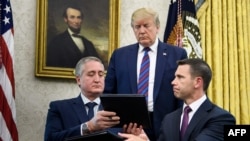GUATEMALA CITY — A migration pact with the United States drew sharply mixed reactions in Guatemala on Saturday, as business groups welcomed it for helping avoid U.S. punitive measures while rights groups called it "cruel and illegal."
U.S. President Donald Trump, who has pushed hard to slow the flow of migrants, said Friday that the "safe third country asylum" agreement would require would-be asylum seekers traveling through Guatemala to seek refuge there, not in the United States. Anyone failing to do so would be sent back to Guatemala.
Most of those migrants would be coming from El Salvador or Honduras.
The pact was signed in Washington on Friday by Kevin McAleenan, the acting secretary of homeland security, and Guatemala's interior secretary, Enrique Degenhart.
Guatemalan human rights ombudsman Jordan Rodas has questioned its legality, saying his country's constitution does not authorize a minister to sign such an agreement. He urged Congress to study it carefully.
Rights group Amnesty International called the agreement "outrageous," saying that "there is no doubt that Guatemala should not be considered a safe place of refuge."
A "safe third" agreement could be legal only if would-be asylum seekers were sent to a truly safe third country, rights groups said.
Guatemala has one of the world's highest homicide rates.
'Very alarming'
"The Trump administration must abandon this cruel and illegal plan," Amnesty's director for the Americas, Charanya Krishnaswami, said in a statement.
Refugees International called the pact "very alarming."
Business groups, however, applauded the deal for sparing Guatemalans potentially severe economic penalties threatened by Trump.
"The risks and consequences of not signing were very great," said Juan Carlos Tefel, president of the Coordinating Committee of Agricultural, Commercial and Industrial Associations.
The Guatemalan-American Chamber of Commerce also registered its approval.
The deal was originally to have been signed July 15 by Trump and Guatemalan President Jimmy Morales, but when Guatemala’s Constitutional Court temporarily blocked the pact, the signing was delayed.
The deal was finalized after Trump threatened to impose tough economic measures on Guatemala, including steep tariffs on imports.
The plan faces an uncertain future. The two candidates vying to succeed the term-limited Morales in an Aug. 11 election — Social Democrat Sandra Torres and right-wing candidate Alejandro Giammattei — have both rejected it.
The U.S. is Guatemala's top trading partner. Remittances last year from Guatemalans in the U.S. amounted to 12 percent of the Central American country's gross domestic product.




